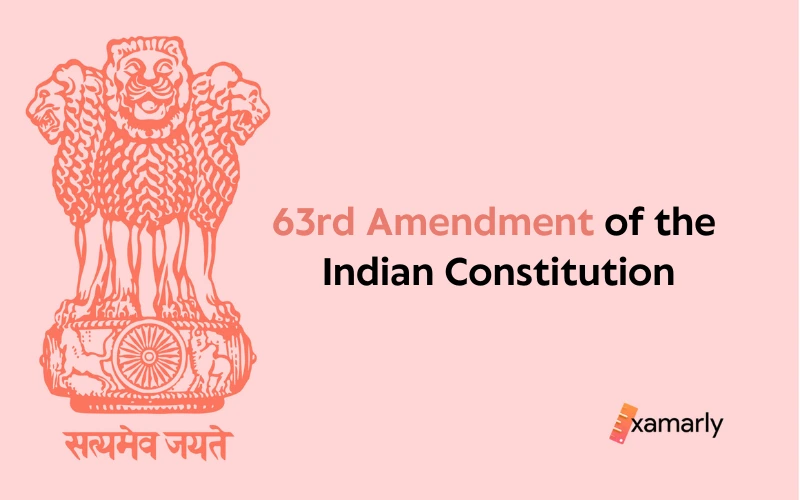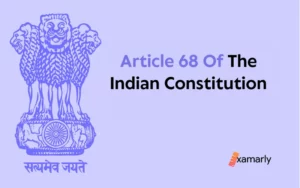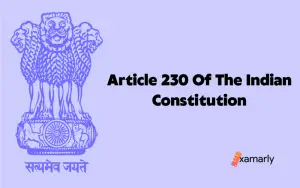The Constitution of India undergoes several constitutional amendments to revise the provisions held in the articles so that the fundamental rights of the citizens are safe and protected.
The 63rd Amendment of the Indian Constitution is regarding the declaration of an emergency in Punjab and the length of the President’s virtue of rule there. The Sixty-Third Amendment Act nullified the amendment to the 59th Amendment of the Indian Constitution, which gave the government special powers to declare an emergency in Punjab.
In this blog, you will learn about one such amendment. You will get to know about the background of the amendment, the date enacted, its Statement of Objects and Reasons, some frequently asked questions, etc. This blog will help in covering your Indian polity portion of the UPSC syllabus.
Check out our blog on the Preamble of the Indian Constitution
Read on to ace your UPSC exam.
- 63rd Amendment of the Indian Constitution: Background
- Salient features and facts
- Date enacted
- Statement of Objects and Reasons
- Prominent people involved
- Important provisions
- Summing Up
- FAQs
- What does the Sixty-Third Amendment of the Constitution of India entail?
- Which constitutional amendment granted special powers to the President of India for declaring an emergency in the State of Punjab?
- In which year was the Sixty-Third constitutional amendment enacted?
- What was the purpose of the 63rd Amendment of the Indian Constitution?
- Who presented the 63rd Constitutional Amendment Bill in the Parliament of India?
63rd Amendment of the Indian Constitution: Background
To address the deteriorating terrorist threat in Punjab, the government intended to declare an emergency under the 59th Amendment to the Constitution, which was hurriedly passed by both houses of Parliament.
When considered essential, it gave the Central Government the power to declare an emergency in Punjab. The amendment guarantees an extension of a maximum of three years of the President’s rule. Previously, two years was the previous maximum time frame.
Also Read: 62nd Amendment of the Indian Constitution
Salient features and facts
The amendment objective of the 63rd Amendment of the Indian Constitution was the Omission of Article 359A and the amendment of Article 356 of the Indian Constitution.
Date enacted
The 63rd Amendment of the Indian Constitution was enacted On January 6, 1990, as the Sixty-third Amendment Act, of 1990.
Statement of Objects and Reasons
- The Constitution (Fifty-ninth Amendment) Act, 1988 was enacted in March 1988 and it made some adjustments to the process for declaring an emergency in Punjab as well as the length of the President’s rule there.
- After further assessment, the government has decided that the exceptional powers envisioned in the amendment about the declaration of an emergency in Punjab are not necessary.
- Additionally, it is believed that the aforementioned act’s modification of Article 356 is no longer necessary. Consequently, it is deemed that now the modifications made by the aforementioned act must be revoked.
- Regarding the President’s announcement made on May 11, 1987, by paragraph one of Article 356 of the Constitution, both Houses of Parliament gave their approval in October 1989.
Prominent people involved
Then Home Minister Mufti Mohammed Sayeed presented the Sixty-Third Amendment bill in the Indian Parliament.
President R. Venkatraman gave his nod for the same.
Important provisions
- Amendment of Article 356.- In Article 356, The provision mentioned in clause (5) of the Indian Constitution shall be removed.
- The Constitution’s Article 359A shall be removed.
You Might Also Like: 64th Amendment of the Indian Constitution
Summing Up
Through this blog for UPSC preparation, you learnt that the Constitution (Sixty-Third Amendment) Act of 1989 nullified the 59th Amendment of the Indian Constitution of 1988, which granted the governmental power to declare a state of emergency in Punjab.
Also, the 63rd Amendment of the Indian Constitution was enacted on January 6, 1990, with the aim of revising Article 356 and omitting Article 359A of the Indian Constitution.
FAQs
What does the Sixty-Third Amendment of the Constitution of India entail?
The 59th Amendment of the Indian Constitution, which gave the government the power to declare an emergency in Punjab, was repealed by the Constitution Sixty-Third Amendment Act of the Parliament of India.
Which constitutional amendment granted special powers to the President of India for declaring an emergency in the State of Punjab?
The 59th Amendment of the Indian Constitution.
In which year was the Sixty-Third constitutional amendment enacted?
The Sixty-Third Amendment Act was enacted on January 6, 1990.
What was the purpose of the 63rd Amendment of the Indian Constitution?
Amendment to Article 356 along with the omission of Article 359A was the purpose of the 63rd Amendment Act of the Indian Constitution.
Who presented the 63rd Constitutional Amendment Bill in the Parliament of India?
Then Home Minister Mufti Mohammed Sayeed presented the Sixty-Third Amendment bill in the Parliament of India.






